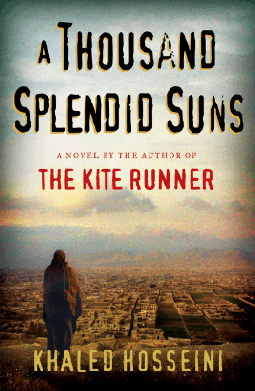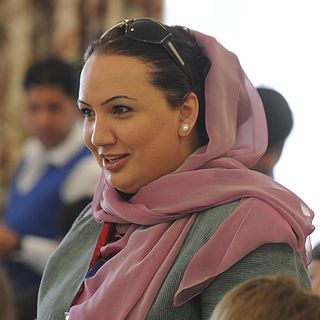
The treatment of women by the Taliban refers to actions and policies by various Taliban regimes which are either specific or highly commented upon, mostly due to discrimination, since they first took control in 1996. During their first rule of Afghanistan (1996–2001), the Taliban were notorious internationally for their misogyny and violence against women. Since 1996, women were mandated to wear the burqa at all times in public. In a systematic segregation sometimes referred to as gender apartheid, women were not allowed to work, nor were they allowed to be educated after the age of eight. Women seeking an education were forced to attend underground schools, where they and their teachers risked execution if caught. They were not allowed to be treated by male doctors unless accompanied by a male chaperone, which led to illnesses remaining untreated. They faced public flogging and execution for violations of the Taliban's laws. The Taliban allowed, and in some cases encouraged, marriage for girls under the age of 16. Amnesty International reported that 80 per cent of Afghan marriages were forced.

Ida Bell Wells-Barnett was an American investigative journalist, educator, and early leader in the civil rights movement. She was one of the founders of the National Association for the Advancement of Colored People (NAACP). Wells dedicated her career to combating prejudice and violence, advocating for African-American equality—especially that of women—and was a prominent Black figure.

Quran desecration is the treatment of the Quran, in its original Arabic form, in a way that might be considered disrespectful or insulting.

Aviva Chomsky is an American teacher, historian, author, and activist. She is a professor of history and the Coordinator of Latin American, Latino and Caribbean Studies at Salem State University in Massachusetts. She previously taught at Bates College in Maine and was a research associate at Harvard University, where she specialized in Caribbean and Latin American history.

Phyllis Chesler is an American writer, psychotherapist, and professor emerita of psychology and women's studies at the College of Staten Island (CUNY). She is a renowned second-wave feminist psychologist and the author of 18 books, including the best-sellers Women and Madness (1972), With Child: A Diary of Motherhood (1979), and An American Bride in Kabul: A Memoir (2013). Chesler has written extensively about topics such as gender, mental illness, divorce and child custody, surrogacy, second-wave feminism, pornography, prostitution, incest, and violence against women.
Alissa Johannsen Rubin is a Pulitzer Prize–winning American journalist, currently serving as the Baghdad Bureau chief for The New York Times. She has spent much of her career covering the wars in Iraq, Afghanistan and the Balkans.

A Thousand Splendid Suns is a 2007 novel by Afghan-American author Khaled Hosseini, following the huge success of his bestselling 2003 debut The Kite Runner. Mariam, an illegitimate teenager from Herat, is forced to marry a shoemaker from Kabul after a family tragedy. Laila, born a generation later, lives a relatively privileged life, but her life intersects with Mariam's when a similar tragedy forces her to accept a marriage proposal from Mariam's husband.
Tanaz Eshaghian is an Iranian-born American documentary filmmaker. She resides in New York City.

Women's rights in Afghanistan have oscillated back and forth depending on the time period. After King Amanullah Khan's attempts to modernize the country in the 1920s, women officially gained equality under the 1964 Constitution. However, these rights were taken away in the 1990s through different temporary rulers such as the mujahideen and the Taliban during the Afghan civil war. During the first Taliban regime (1996–2001), women had very little to no freedom, specifically in terms of civil liberties. When the Taliban was overthrown by the United States following the 9/11 attacks, women's rights gradually improved under the presidential Islamic Republic of Afghanistan. Women were de jure equal to men under the 2004 Constitution.
The mass media in Afghanistan is monitored by the Ministry of Information and Culture (MoIC), and includes broadcasting, digital and printing. It is mainly in Dari and Pashto, the official languages of the nation. It was reported in 2019 that Afghanistan had over 107 TV stations and 284 radio stations, including 100s of print media and over 1,800 online media outlets. After the return of the Islamic Emirate of Afghanistan (IEA) in 2021, there was a concern that the mass media will significantly decrease in the country. The number of digital media outlets is steadily increasing with the help of Facebook, Instagram, TikTok, Twitter, YouTube, and other such online platforms. IEA's spokesman Zabihullah Mujahid suggested that the media should be in line with Sharia and national interests.

Shukria Barakzai is an Afghan politician, journalist and a prominent Muslim feminist. She was the Ambassador of Afghanistan to Norway. She is a recipient of the International Editor of the Year Award.

Ann Mary Devroy was an American political journalist. She was a White House correspondent for 15 years, for the Gannett Company, USA Today (1979–1985), and The Washington Post (1989–1997). She covered four presidents including Jimmy Carter, Ronald Reagan, George H. W. Bush and Bill Clinton, and 10 White House chiefs of staff.

Katherine Emily Holt is a British photojournalist, who works primarily across Africa and the Middle East to gather humanitarian and development stories for NGOs and private companies, as well as the UK and global media. She is also the director of communications agency, Arete.
Hamida Barmaki was a renowned Afghan law professor and human rights activist. She was killed together with her family in a suicide attack.

Farkhunda Malikzada, commonly referred to as Farkhunda, was a 27-year-old woman who was publicly lynched by a mob in Kabul, the capital of Afghanistan, on 19 March 2015. A large crowd formed in the streets around her claiming that she had burned the Quran, and for that, her accusers announced that she must be sent to Hell right away.
Kimberley Chongyon Motley is an American international human rights and civil rights lawyer. She is an attorney, author, entrepreneur, and former Mrs. Wisconsin-America 2004. Motley is the first foreign attorney to practice in Afghanistan since 2008.
Humira Saqib is an Afghan journalist and women's human rights activist. Through her writings in the magazine Negah-e-Zan and in Afghan Women's News Agency, she has been protesting against extreme forms of harassment against women in her radically Islamic country. She has pleaded for parliament to enact laws for the elimination of violence against women. Saqib pursues her efforts to further women's rights by working for the women's news agency as a writer and editor.
Susan Schechter was an American feminist and activist against domestic violence. She wrote three books on the subject and helped found one of the first women's shelters.
On 15 August 2021, the city of Kabul, the capital of the Islamic Republic of Afghanistan, was captured by Taliban forces during the 2021 Taliban offensive, concluding the War in Afghanistan that began in 2001. The fall of Kabul provoked a range of reactions across the globe, including debates on whether to recognize the Taliban as the government of Afghanistan, on the humanitarian situation in the country, on the outcome of the War, and the role of military interventionism in world affairs.












